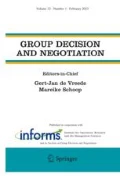Abstract
In recent years, multi-organizational collaboration has become more and more important in both business and research. We conducted an action research (AR) intervention with a consortium of Finnish universities that needed to revise its joint strategy. We designed and facilitated a repeatable collaboration process for this multi-organizational strategy development. The process was built using the Collaboration Engineering (CE) approach with thinkLets, which provides expert-level advice for novice facilitators, and it was powered by Group Support Systems (GSS). Our overall impression of CE’s ability to provide valuable design and facilitation support for complex processes is very affirmative. The consortium was satisfied with the intervention, as it saved huge amounts of time compared with conventional strategic work. The process was also seen as more democratic, because the GSS tools enabled equal participation during the session. Our study also provides a ready-to-apply CE process recipe to organizations for revising their strategy. Through this recipe, supplemented with knowledge on thinkLets, the strategy development process may easily be repeated by other facilitators or even practitioners.
Similar content being viewed by others
References
Ackermann F. et al. (2005). GSS for Multi-Organizational Collaboration: Reflections on Process and Content. Group Decision and Negotiation 14(4):307–331
Adkins M., Burgoon M., Nunamaker J. F. (2003). Using Group Support Systems for Strategic Planning with the United States Air Force. Decision Support Systems 34(3):315–337
Austin, T., N. Drakos, and J. Mann. (2006). Web Conferencing Amplifies Dysfunctional Meeting Practices, Gartner Research, Nr. G00138101, Gartner, Inc., March 13, 2006
Bajwa, D. S., L. F. Lewis, and G. Pervan. (2003). Adoption of Collaboration Information Technologies in Australian and US Organizations: A Comparative Study, Proceedings of the 36th Hawaii International Conference on System Sciences, Hawaii, USA, IEEE, 1–10
Baskerville R., Myers M. D. (2004). Special Issue on Action Research in Information Systems: Making IS Research Relevant to Practice. MIS Quarterly 28(3):329–335
Bragge, J., M. den Hengst, T. Tuunanen, and V. Virtanen. (2005a). “A Repeatable Collaboration Process for Developing a Road Map for Mobile Marketing,” Proceedings of the the 11th Americas Conference on Information Systems AMCIS, August 11–14, Omaha, USA
Bragge, J. and H. Merisalo-Rantanen. (2005). “Insights on Developing a Collaboration Process for Gathering Innovative End-User Feedback on Information Systems,” Proceedings of the Group Decision and Negotiation Conference, July 10–13, Vienna, Austria, pp 1–25
Bragge J., Merisalo-Rantanen H., Hallikainen P. (2005b). Gathering Innovative End-User Feedback for Continuous Development of Information Systems: A Repeatable and Transferable E-Collaboration Process. IEEE Transactions on Professional Communication 48(1):55–67
Bragge, J., H. Merisalo-Rantanen, A. Nurmi, and L. Tanner. (2005c). “GSS-Enabled Strategy Development in a Multi-Organization Environment,” Proceedings of the Group Decision and Negotiation Conference, July 10–13, Vienna, Austria, pp. 1–27
Briggs R. O., de Vreede G. J. (2001). ThinkLets: Building Blocks for Concerted Collaboration (Version 1.0 ed). Tucson, GroupSystems.com
Briggs R. O., de Vreede G. J., Nunamaker J. F. (2003). Collaboration Engineering with ThinkLets to Pursue Sustained Success with Group Support Systems. Journal of Management Information Systems 19(4):31–64
Chandler A. D. (1962). Strategy and Structure. Cambridge, Massachusetts, MIT Press
de Vreede, G. J. and R. O. Briggs. (2005). “Collaboration Engineering: Designing Repeatable Processes for High-Value Collaborative Tasks,” Proceedings of the 38th Hawaii International Conference on System Sciences, January 3–6, Hawaii, USA, IEEE
de Vreede G. J., de Bruijn H. (1999). Exploring the Boundaries of Successful GSS Application: Supporting Inter-Organizational Policy Networks. DataBase 30(3–4):111–131
Dennis A. R. et al. (1997). Group Support Systems for Strategic Planning. Journal of Management Information Systems 14(1):155–184
Eden C., Ackermann F. (2001). Group Decision and Negotiation in Strategy Making. Group Decision and Negotiation 10(2):119–140
Fisher R., Brown S. (1988). Getting Together: Building a Relationship that Gets to Yes. Boston, Mass, Houghton-Mifflin
Freedman M. (2003). The Genius is in the Implementation. Journal of Business Strategy 24(2):23–31
Gartner, Inc. (2005). Gartner Says WWW Conferencing and Team Collaboration Software Market Will Exceed $1.1 Billion by 2008, Press release, March 23, 2005
Greene J. (2005). Combat over Collaboration. BusinessWeek 18(4):65–66
Hansen, M.T. and N. Nohria. (2004). “How to Build Collaborative Advantage,” MIT Sloan Management Review, Fall, 22–30
Kasanen E., Lukka K., Siitonen A. (1993). The Constructive Approach in Management Accounting Research. Journal of Management Accounting Research 5(Fall):243–264
Kolfschoten, G. L., R. O. Briggs, G. J. de Vreede, P. H. M. Jacobs, and J. Appelman. (2006). “A Conceptual Foundation of the ThinkLet Concept for Collaboration Engineering,” International Journal of Human-Computer Studies, 64(7), 611–621
Lau F. (1999). Toward a Framework for Action Research in Information Systems Studies. Information Technology & People 12(2):148–175
Mantere, S., V. Hämäläinen, P. Aaltonen, H. Ikävalko, and V. Teikari. (2003). Implementing the Organizational Strategy: From Plans to Practice (Finnish Ed.), Helsinki: Edita Publishing Oy
Mingers J. (2001). Combining IS Research Methods: Towards a Pluralist Methodology. Information Systems Research 12(3):240–259
Mintzberg H. (1978). Patterns in Strategy Formation. Management Science 24(9):934–948
Munkvold B. E., Zigurs I. (2005). Integration of E-Collaboration Technologies: Research Opportunities and Challenges. International Journal of e-Collaboration 1(2):1–24
Nunamaker J. F. et al. (1991). Electronic Meeting Systems to Support Group Work. Communications of the ACM 34(7):40–61
Nurmi, A., P. Hallikainen, and M. Rossi. (2005). “Coordination of Outsourced IS Development in Multiple Customer Environment-A Case Study of a Joint ISD Project,” Proceedings of the 38th Hawaii International Conference on System Sciences, Hawaii, USA, 1–10
Orwig R. et al. (1997). A multi-agent view of strategic planning using group support systems and artificial intelligence. Group Decision and Negotiation 6(1):37–59
Pollard C. (2003). Exploring Continued and Discontinued Use of IT: A Case Study of OptionFinder, a Group Support System. Group Decision and Negotiation 12:171–193
Quinn J. B. (1999). Strategies for Change. In: Mintzberg H., Quinn J. B. (eds), The Strategy Process. Concepts, Contexts, Cases. Englewood Cliffs, New Jersey, Prentice-Hall
Raiffa H., Richardsson J., Metcalfe D. (2002). Negotiation Analysis. The Science and Art of Collaborative Decision Making. Cambridge, Massachusetts, The Belknap Press of Harvard University Press
Susman G. I., Evered R. D. (1978). An Assessment of the Scientific Merits of Action Research. Administrative Science Quarterly 23(4):582–603
Thompson A. A. Jr., Gamble J. E., Strickland A. J. III. (2004). Strategy: Winning in the Marketplace: Core Concepts, Analytical Tools, Cases. New York, McGraw-Hill
Tyran C. K. et al. (1992). The Application of Electronic Meeting Technology to Support Strategic Management. MIS Quarterly 16(3):313–334
Acknowledgements
The authors thank the two anonymous referees for their comments on improving this paper. This research was supported in part by the Marcus Wallenberg’s Foundation for Business Research, the HSE Foundation, and the Finnish Foundation for Economic and Technology Sciences.
Author information
Authors and Affiliations
Corresponding author
Rights and permissions
About this article
Cite this article
Bragge, J., Merisalo-Rantanen, H., Nurmi, A. et al. A Repeatable E-Collaboration Process Based on ThinkLets for Multi-Organization Strategy Development. Group Decis Negot 16, 363–379 (2007). https://doi.org/10.1007/s10726-006-9055-5
Received:
Revised:
Accepted:
Published:
Issue Date:
DOI: https://doi.org/10.1007/s10726-006-9055-5




